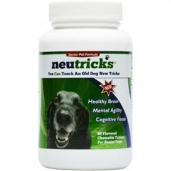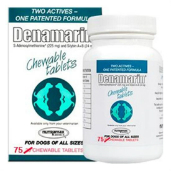Cognitive Dysfunction Syndrome (CDS) in dogs is best understood as something akin to senility in aging humans. As with humans, dogs experience some cognitive decline as they get older. In dogs, the condition is progressive and can eventually resemble what we know as dementia. Typical onset of CDS occurs between the ages of 8 and 10, by which point an estimated 50 percent of dogs exhibit at least one symptom.
"MAOI pet medications have been shown to greatly reduce the symptoms of CDS and enhance quality of life for affected dogs."
Symptoms of Canine Cognitive Dysfunction Syndrome
Disorientation is a major symptom of CDS in dogs. It manifests in a variety of ways, but typically an affected dog seems lost or confused, even in familiar surroundings such as the house or yard. The dog may have difficulty getting out of corners, getting out from behind furniture, or passing through doorways. Periods of prolonged staring or seeming spaced out are not uncommon. Affected dogs may forget why they have gone outside or may not recognize familiar people, their name, or common verbal cues and commands. Housetraining may become undone, with dogs not requesting to go outside and defecating or urinating in the house.
The dog’s interactions with people and other animals suffer. Enthusiasm declines, greetings become fewer, and the dog seeks less attention. Dogs afflicted with CDS often experience activity and sleep disturbances. Their activity level declines and they exhibit less interest in play and other socialization. Activity may degenerate into aimless wandering. Apparently compulsive behaviors, such as pacing or circling, may be seen. Dogs may also increase the hours they spend napping during the day and have difficulty falling or staying asleep at night.

Diagnosis of Cognitive Dysfunction Syndrome in Dogs
There is no definitive test to confirm or rule out CDS. The diagnosis comes from consideration of the symptoms and their severity and exclusion of other possible causes of those symptoms. Because numerous medical conditions cause the various symptoms associated with CDS in dogs--most of which do have definitive tests--your veterinarian will perform appropriate tests for suspected conditions. If no other underlying cause for the symptoms is discovered, a diagnosis of CDS is accepted.

Canine Cognitive Dysfunction Syndrome Treatments
The medication Anipryl (selegiline) is the primary course of treatment for canine CDS. This drug is a monoamine oxidase inhibitor (MAOI) used to treat Parkinson’s disease in humans, and it was the first medication approved by the FDA to treat CDS in dogs. It has been shown to greatly reduce the symptoms of CDS and enhance quality of life for affected dogs. In fact, up to 75 percent of treated dogs show improvement with at least one clinical sign within one month of once-daily dosing, reports the Claws & Paws Veterinary Hospital. Additional support is usually recommended in the form of increased antioxidant intake through dietary changes and/or supplementation.
Nutritional supplements like Denamarin and Novifit provide dogs with SAMe (S-Adenosylmethionine), which acts as a neuroprotector and helps support brain health. Another option to help keep your older dog mentally sharp is to use Neutricks. Neutricks contains apoaequorin, a substance from Aequoria Victoria jellyfish, which replaces the proteins that protect your dog's brain cells. Of course, talk to your veterinarian before starting your senior dog on any supplement regimen.
References
http://www.cpvh.com/2011/07/24/cognitive-dysfunction-canine/
http://pets.webmd.com/dogs/cognitive-dysfunction-syndrome-dogs
The above is provided for information purposes only and should not be used for the diagnosis or treatment of any condition.
This information does not cover all possible variables, conditions, reactions, or risks relating to any topic, medication, or product and should not
be considered complete. Certain products or medications may have risks and you should always consult your local veterinarian concerning the treatment of
your pet. Any trademarks are the property of their respective owners.